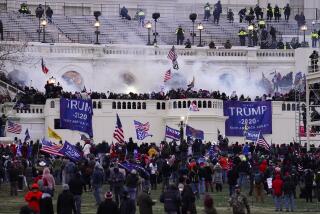Terror Funding Charges Rejected
- Share via
A federal judge Friday dismissed an indictment against seven people accused of raising money in Los Angeles for an Iranian opposition group, ruling that the State Department’s procedure for classifying the group as a terrorist organization was unconstitutional.
Prosecutors charged that the seven defendants--five Iranians and two Iranian Americans-- were members of a cell of Moujahedeen Khalq, also known as MEK, which is seeking to overthrow the current Iranian government.
In his 19-page ruling, U.S. District Court Judge Robert M. Takasugi found that the process by which the State Department designates groups such as MEK as terrorist organizations deprives them of their constitutional due process rights. That, the judge said, is in part because the groups are not allowed to challenge the evidence against them before they are declared terrorist organizations.
“National security is certainly a matter of grave concern and responsibility,” Takasugi wrote. But, “the argument for national security should not serve as an excuse for obliterating the Constitution.”
The U.S. attorney’s office in Los Angeles had no immediate comment on the ruling. But spokesman Thom Mrozek said the government was reviewing its options, including a possible appeal.
Richard Steingard, an attorney for one of the defendants, hailed the decision.
“We have never understood why the government was prosecuting the one group of people willing to stand up to the present regime in Iran, which the president of the United States has described as part of the ‘axis of evil,’ ” he said.
Takasugi’s ruling has no immediate impact on any other cases of this kind. However, if the government appeals the decision to the U.S. 9th Circuit Court of Appeals and loses, it would immediately affect federal courts in many Western states.
The defendants were accused of raising more than $1 million at Los Angeles International Airport and funneling the money to the MEK.
Although the U.S. State Department declared MEK a terrorist organization in 1997, the group has attracted wide support among both Democrats and Republicans in Congress. More than 220 members both Houses signed a petition asking the State Department to drop the MEK from its terrorist list.
The MEK began in the 1960s, one of many groups opposing the shah of Iran. But after the shah’s downfall in 1979, it ran afoul of the Islamist regime and went into exile. Outlawed in Iran, the group is now based in Iraq, where it stages cross-border raids on Iran, according to the U.S. State Department’s biennial terrorist report.
Federal prosecutors in Los Angeles charged that the defendants solicited money from Asian travelers, , saying they were from the Committee for Human Rights in Iran, which authorities said was a front for MEK. The government suspected some of the money could have been used to buy arms abroad.
MEK was classified as a terrorist organization following the government’s standard procedures: the State Department formally determined that the foreign-based organization engaged in terrorism that could threaten U.S. security.
The way the process works, the State Department is required to notify high-ranking members of Congress and provide evidence--sometimes classified--that the group is engaged in terrorist activity. Seven days after that, a notice designating the group as a foreign terrorist organization is published in the Federal Register. he group’s assets may then be frozen and individuals may be prosecuted for raising money for the group.
The group in question is not informed that it is under suspicion before publication in the Federal Register. Group members are also not allowed to see any classified evidence against them.
Last year, the U.S. Circuit Court in Washington, D.C., found that the MEK was denied its constitutional due process rights. But instead of striking down the terrorist designation, the court created a process by which the State Department could correct any due process problem.
On Friday, Takasugi said he disagreed with that court.
“I will not ... allow this criminal case to proceed if the evidence indicates that [the foreign terrorist designation] was procured in violation of the Constitution.”
But one federal law enforcement source said, “I don’t know how anyone wouldn’t think this is a big disappointment after all the time spent on this case. Especially with all the terrorism stuff going on, it’s just stunning that this happened.”
Indicted were Roya Rahmani, 40; Mustafa Ahmady, 47; Hossein Afshari, 44; Alireza Mohammadmoradi, 31; Mohammad Omidvar, 45; Navid Taj, 51; and Hassan Rezaie, 47, all of Los Angeles.
They contended that the money they collected at LAX and through other solicitations in the Iranian community was intended to help feed starving Iranian children.
The government alleged that the group raised as much as $10,000 a day in Los Angeles, depositing more than $1 million into Turkish bank accounts.
In 1999, according to prosecution documents, about $400,000 was transferred from the Turkish accounts to a used auto parts store in the United Arab Emirates and then used to buy rocket-propelled grenades, mortars and other arms. The defendants were also accused of using high-pressure tactics with foreign travelers at LAX, telling some that they were “required” to give at least $20 to $50.
*
Times staff writer Greg Krikorian contributed to this story.
More to Read
Sign up for Essential California
The most important California stories and recommendations in your inbox every morning.
You may occasionally receive promotional content from the Los Angeles Times.













